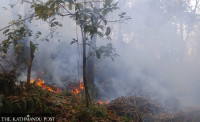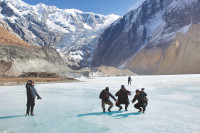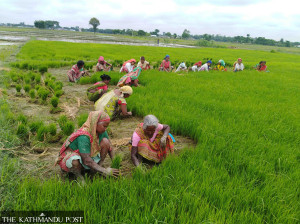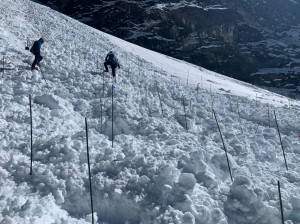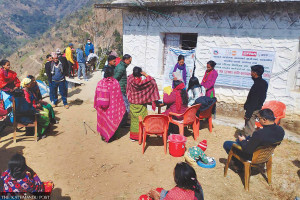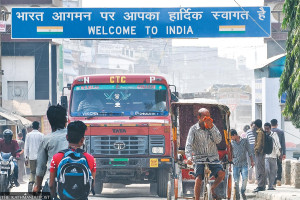 16.12°C Kathmandu
16.12°C KathmanduClimate & Environment
Contractors to discuss green development as builders from countries gather in Kathmandu
Nepal ranks 10th among nations most affected by climate change, according to the Global Climate Risk Index 2021.
Post Report
Contractors from the Asian and Western Pacific region will discuss promoting sustainable infrastructure when they participate in an international convention in Kathmandu starting Wednesday.
The main theme of the 46th convention of the International Federation of Asian and Western Pacific Contractors' Associations (IFAWPCA) is partnership in sustainable infrastructure.
Contractors from various countries will discuss sustainable infrastructure development just before the COP28 (28th Conference of the Parties of the United Nations Framework Convention on Climate Change) takes place in the United Arab Emirates in late November.
Climate change has been blamed for some of the major infrastructure collapses in Nepal, India and Pakistan and other countries in recent years.
For instance, a massive landslide struck Nepal’s Melamchi Drinking Water Project in 2021 and flashfloods damaged three hydropower plants with a combined capacity of 2,210MW in Sikkim, India, last month. These events are linked to the impact of climate change.
“Given the effects of climate change on key infrastructure, we are discussing a partnership for sustainable infrastructure,” said Rabi Singh, president of the Federation of Contractors’ Association of Nepal (FCAN). “It is to draw the wider world’s attention to the impact of climate change on infrastructure and the importance of sustainable ways of infrastructure building.”
As many as 242 delegates are participating in the convention, according to Singh. And not only does climate change affect the infrastructure, the infrastructure-building process contributes a lot of greenhouse emissions globally.
The construction and use of our built environment account for about 40 percent of the global greenhouse gas (GHG) emissions and nearly a third of all waste during the manufacture and procurement of construction material, actual construction, operation and maintenance and demolition and waste processing, according to reports, according to IFAWPCA.
Though Nepal’s contribution to greenhouse emissions is negligible, it is one of the most vulnerable countries to climate change. In June, a massive flood on Hewa Khola in Sankhuwasabha district killed at least three people while 18 others went missing.
The floods in the eastern region also damaged the infrastructure of 30 power projects—13 operating and 17 under construction—according to the Independent Power Producers’ Association of Nepal (IPPAN). Environmentalists quickly blamed climate change for the disaster.
This vulnerability has surfaced while Nepal aggressively pursues mega hydropower projects, highways, and railways, among others, raising questions about the fate of these big projects under growing climate uncertainties.
Nepal ranks 10th among the most affected countries by climate change in the world, according to the Global Climate Risk Index 2021, prepared by Germanwatch, a non-government organisation based in Bonn, Germany.
As the party responsible for building infrastructure, contractors have also started discussing ways to build infrastructure without causing severe damage to the environment.
“We are witnessing the damage to our infrastructure caused by climate change and countries like Nepal should be compensated with resources to help them build sustainable infrastructure,” said Singh, the FCAN president.
Given its limited resources, Nepal cannot spend big on high-quality infrastructure. “For example, rural roads are unsustainable because they are built without maintenance budget,” said Sushil Babu Dhakal, director general at the Department of Roads. “Rural roads are built with the aim of improving people’s access, rather than sustainability.”
In recent years, haphazard road works in hilly areas have also been the source of landslides and flooding. Sustainable infrastructure involves building roads, structures, and energy and water infrastructure with due consideration to economic, social and environmental implications. Nepal’s national highways are built, taking sustainability into consideration and by following environmental rules and regulations, Dhakal said.





